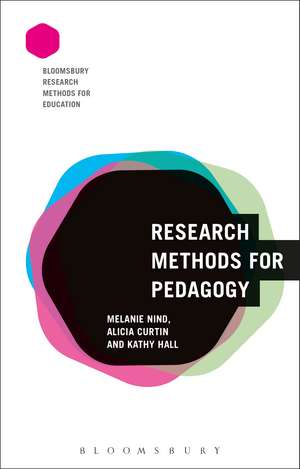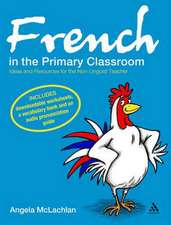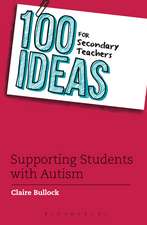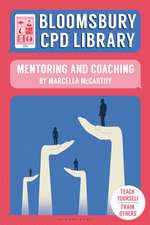Research Methods for Pedagogy: Bloomsbury Research Methods for Education
Autor Prof. Melanie Nind, Dr Alicia Curtin, Professor Kathy Hallen Limba Engleză Paperback – 5 oct 2016
| Toate formatele și edițiile | Preț | Express |
|---|---|---|
| Paperback (1) | 179.56 lei 43-57 zile | |
| Bloomsbury Publishing – 5 oct 2016 | 179.56 lei 43-57 zile | |
| Hardback (1) | 714.77 lei 43-57 zile | |
| Bloomsbury Publishing – 5 oct 2016 | 714.77 lei 43-57 zile |
Preț: 179.56 lei
Preț vechi: 220.20 lei
-18% Nou
Puncte Express: 269
Preț estimativ în valută:
34.36€ • 35.97$ • 28.43£
34.36€ • 35.97$ • 28.43£
Carte tipărită la comandă
Livrare economică 07-21 aprilie
Preluare comenzi: 021 569.72.76
Specificații
ISBN-13: 9781474242813
ISBN-10: 1474242812
Pagini: 296
Ilustrații: 10 bw illus
Dimensiuni: 138 x 216 x 21 mm
Greutate: 0.39 kg
Editura: Bloomsbury Publishing
Colecția Bloomsbury Academic
Seria Bloomsbury Research Methods for Education
Locul publicării:London, United Kingdom
ISBN-10: 1474242812
Pagini: 296
Ilustrații: 10 bw illus
Dimensiuni: 138 x 216 x 21 mm
Greutate: 0.39 kg
Editura: Bloomsbury Publishing
Colecția Bloomsbury Academic
Seria Bloomsbury Research Methods for Education
Locul publicării:London, United Kingdom
Caracteristici
Moves beyond schools and formal pedagogies into informal and everyday pedagogies, using a range of educational contexts to illustrate various mixed methods to use
Notă biografică
Melanie Nind is Professor of Education at the University of Southampton, UK. She is Co-Director of ESRC National Centre for Research Methods and Co-Editor of the International Journal of Research & Method in Education. Alicia Curtin is a Lecturer in the School of Education at University College Cork, Ireland. Kathy Hall is Professor of Education and Head of the School of Education at University College Cork, Ireland.
Cuprins
AcknowledgementsSeries Editor PrefaceA Glossary of Research Methods and ApproachesIntroductionPart I: Conceptions of Pedagogy and Implications for ResearchIntroduction to Part One: Conceptions of Pedagogy and Implications for Research Chapter 1: Pedagogy - Theoretical Perspectives and Methodological ImplicationsChapter 2: Different Pedagogies - Different Research Methods: Values into PracticeChapter 3: Teasing out Pedagogy: The Art, Craft and SciencePart II: Researching Pedagogy in ContextIntroduction to Part Two: Researching Pedagogy in Context Chapter 4: Researching Pedagogy in Early Childhood Settings: Ethnographic, Multimodal and Chapter 5: Researching Pedagogy in Schools: Methods Focused on Classroom Interaction, Chapter 6: Researching the Everyday and Out-of-School: Research Methods and InnovationPart Three: Researching the Hidden and Hard-to-knowIntroduction to Part Three: Researching the Hidden and Hard-to-knowChapter 7: Pedagogy as Interaction: Methods for Reflecting on Interaction and Methods Chapter 8: Pedagogy Embodied: Methods of Analysis for Embodied PracticeChapter 9: Pedagogy as Space: Pushing Methodological BoundariesConclusionReferencesIndex
Recenzii
This is one of the most helpful books for educational researchers that I have seen in some time ... It is complex and multi-layered, but considerate to the reader, accomplishing an ambitious and worthy goal. It is internationally informed, discusses multiple methods and provides clear summaries with great synthesis tables ... I really appreciated this book.
The interaction between what pedagogy does and what pedagogy is appears as the central focus of this book. The approach taken goes beyond a disciplinary or methodological perspective and faces the core of the social context of teaching and learning. In a different direction of recent books and political decisions about how learning should be researched, the authors invite readers to put learning in context and research the experiences of learning from a socio-cultural perspective. Avoiding simplicity and coping with complexity this book encourages us to research pedagogy "incorporating specified, enacted and experienced dimensions in practice". Based on the analysis of several studies readers will find a broad set of insights and suggestions to develop research on the values and ways of knowing mediated by different pedagogies. This is a necessary book to introduce a turn in pedagogical research based on 'what works' in favour of a more inclusive and critical pedagogical research.
I think this book is absolutely excellent. One of the best on this topic that I have seen, very accessibly written and with plenty of practical guidance.
This is a very useful text for students who are taking a more philosophical and theoretical approach to their educational studies rather than a more applied approach. This book usefully defines pedagogy as an acceptable field of study and situates in different domains to psychology, sociology or history of education - this is important when considering education's place in the research landscape.
The interaction between what pedagogy does and what pedagogy is appears as the central focus of this book. The approach taken goes beyond a disciplinary or methodological perspective and faces the core of the social context of teaching and learning. In a different direction of recent books and political decisions about how learning should be researched, the authors invite readers to put learning in context and research the experiences of learning from a socio-cultural perspective. Avoiding simplicity and coping with complexity this book encourages us to research pedagogy "incorporating specified, enacted and experienced dimensions in practice". Based on the analysis of several studies readers will find a broad set of insights and suggestions to develop research on the values and ways of knowing mediated by different pedagogies. This is a necessary book to introduce a turn in pedagogical research based on 'what works' in favour of a more inclusive and critical pedagogical research.
I think this book is absolutely excellent. One of the best on this topic that I have seen, very accessibly written and with plenty of practical guidance.
This is a very useful text for students who are taking a more philosophical and theoretical approach to their educational studies rather than a more applied approach. This book usefully defines pedagogy as an acceptable field of study and situates in different domains to psychology, sociology or history of education - this is important when considering education's place in the research landscape.

















